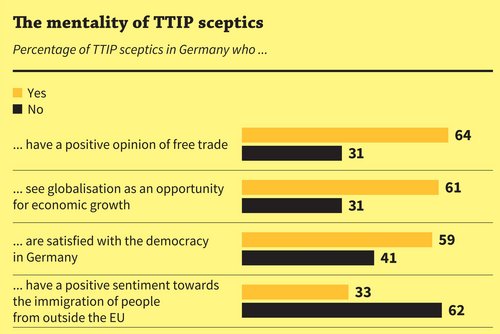Despite the major protest movement against the transatlantic free trade agreement, the majority of TTIP sceptics still speak out in favour of free trade and globalisation. So, what are TTIP opponents actually protesting, if, at the same time, they endorse unlimited international trade? In reality, the defensive attitude towards TTIP feeds on issues that have little to do with the agreement itself.
Paradoxical protest
Over 150,000 people came to the mass demonstration against TTIP, held in Berlin in October 2015, and an anti-TTIP petition has already accumulated three million signatures. In short, the TTIP sceptics are clearly well organised. Perhaps this has to do with their profile: while they come from all age and income brackets, they all have an above-average education and lean more towards the left of the political spectrum.
But what exactly are the protests directed at? Surely not against free trade – which is predominantly seen in a positive light in Germany (see chart).
According to a survey conducted by the European Commission, three out of every four Germans are supportive of free trade.
The word “globalisation” also elicits positive emotions from the majority of respondents. “Protectionism”, on the other hand, is only seen as something good by a scant third of the surveyed individuals.
The survey results could be summarised as follows: “Free trade is good, but we don’t want TTIP.” This finding does not greatly vary, even when viewing the responses of TTIP sceptics alone; this group, too, is dominated by supporters of free trade (see second chart).
Two out of every three TTIP sceptics have a positive opinion of free trade. Almost just as many hold the view that globalisation can benefit economic growth.
Views on the European Union as an institution, however, are negative. Only one out of every three TTIP sceptics is satisfied with the democracy in the EU, and only one out of every five has trust in it. The economic situation in Europe also receives lower ratings than the economy in Germany, which is considered to be much stronger. And incidentally, this last view is shared by Germans on both sides of the TTIP debate.
TTIP supporters in other European countries, however, assess the matter quite differently. They frequently consider the economic situation in their home country as being worse than that of the EU. Those in favour of TTIP see the transatlantic free trade agreement as a chance to improve the economic conditions in their own country – a goal that is clearly not considered quite as urgent in Germany.
Increasing the volume of data reveals further findings on Germany’s TTIP sceptics. Not only are they more likely to hold a critical view of globalisation compared to TTIP supporters, but they are also more sceptical of large companies. Additionally, TTIP sceptics are more likely to associate negative feelings with their views on immigration from countries outside of Europe. These feelings cannot be precisely defined on the basis of the survey – whether they may be feelings of fear or pity, for instance. However, scientific literature frequently cites patriotism and ethnocentrism – a sense of superiority over other nations – as reasons for opposing free trade.
Thus, TTIP scepticism feeds largely on arguments and sentiments that have little direct relation to the agreement itself. In the public debate surrounding TTIP, discussion regularly focuses on issues of the Single Market and European integration. These are, no doubt, important topics; and yet their consideration only leads to unnecessary further polarisation in the TTIP negotiation process.
A comprehensive and faster information policy would be an effective means to prevent TTIP scepticism from spreading. While the negotiations have been underway for nearly three years now, very few people know what this massive agreement is really about. Since the start of 2015, the European Commission has published a number of TTIP documents on its website as part of a transparency initiative; but it will still be some time before this information reaches the people in the individual EU member countries.
The negotiation documents leaked by Greenpeace at the beginning of May have also shown the extent of people’s hunger for information and the bias plaguing the TTIP debate. The documents, which had been kept confidential up that point, revealed the distance that still lies between the positions of the EU and the US on some key issues – but no more and no less. And yet there was a huge commotion, because the documents were often equated with a final, negotiated agreement text.
If the transatlantic free trade agreement is to stand a chance, the European Commission and the German government will have to overcome any doubts they have about the possibility of still reaching compromises, even on sensitive issues such as investor protection. Why shouldn’t t he United States get involved in improving international laws on investment issues? After all, didn’t Europe succeed in this point with Canada within the framework of the CETA? CETA’s new investor protection system prohibits unjust litigation, provides for a constant, institutionalised court for the settlement of investment disputes, ensures full procedural transparency and establishes an appeal system.
More on the topic
Not so Different?: Dependency of the German and Italian Industry on China Intermediate Inputs
On average the German and Italian industry display a very similar intermediate input dependence on China, whether accounting for domestic inputs or not.
IW
China’s Trade Surplus – Implications for the World and for Europe
China’s merchandise trade surplus has reached an all-time high and is likely to rise further. A key driver appears to be a policy push to further bolster Chinese domestic manufacturing production, implying the danger of significant overcapacities.
IW
